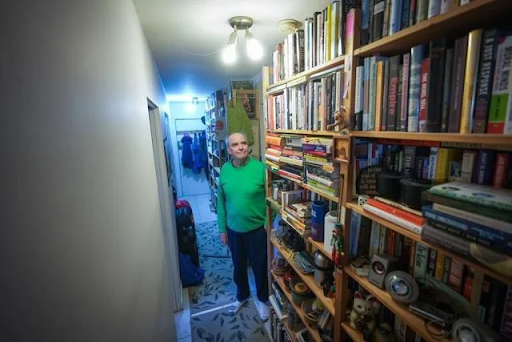
John William, who is losing his sight, poses for a photograph with his collection of books that he has decided to sell, in Vancouver, on Wednesday, April 24, 2024. THE CANADIAN PRESS/Darryl Dyck
Over the past decade, John William has been adapting to his vision loss by finding alternative ways to enjoy his extensive personal library. Currently, he relies on glasses and a magnifying glass with bright lights to read his books. However, as his vision continues to decline, he has decided to part ways with much of his collection of approximately 3,500 books.
William's decision stems from health concerns, including multiple spine surgeries that restrict his ability to lift heavy objects. Many of his books weigh as much as five kilograms, posing a risk to his physical well-being. Additionally, he notes that a significant portion of his collection, ranging from a comprehensive study on the human cell to a rare first edition detailing the history of the Korean War, is not available in large print or audiobook format. This realization has prompted him to sell off a substantial portion of his collection, as he fears that once his books are no longer accessible to him, their unique content will be lost forever.
In an effort to find new homes for his cherished books, William took to a local buy and sell Facebook group, where he posted a detailed spreadsheet listing each title available for sale. He has already managed to place hundreds of books with interested buyers, with many going to families who homeschool their children or university students.
William's apartment is adorned with over a dozen bookshelves, housing a diverse array of literature. From profiles of corporate giants like ExxonMobil to historical accounts of the Cold War, his collection spans a wide range of subjects. However, he admits that his fiction selection is relatively limited, preferring non-fiction works that offer insights into real-life events and phenomena. Despite this preference, he still appreciates classics like Tolstoy's "War and Peace."
His passion for reading began during his university years, where he pursued a double major in philosophy and English literature, later obtaining a master's degree in philosophy. Although he doesn't reference his books as frequently as he did during his academic studies, he takes comfort in having them readily available.
William's collection initially comprised around 400 books, which he left behind with a friend while traveling, only to discover that they had disappeared upon his return. Despite this setback, his love for books remained steadfast throughout his life, which included eight years of living in Japan and various occupations, including construction work and computer repair.
He has a preference for smaller, independent bookstores like Duthie Books, valuing their curated selection chosen by fellow book enthusiasts over larger national chains. William's approach to book buying involves carefully examining each book for its potential value and content before making a purchase.
Despite his acceptance of his impending vision loss, William hopes that his books will find new homes where they will be appreciated and cherished. He acknowledges that his condition is beyond his control and is resigned to the fact that he will soon be unable to see.















